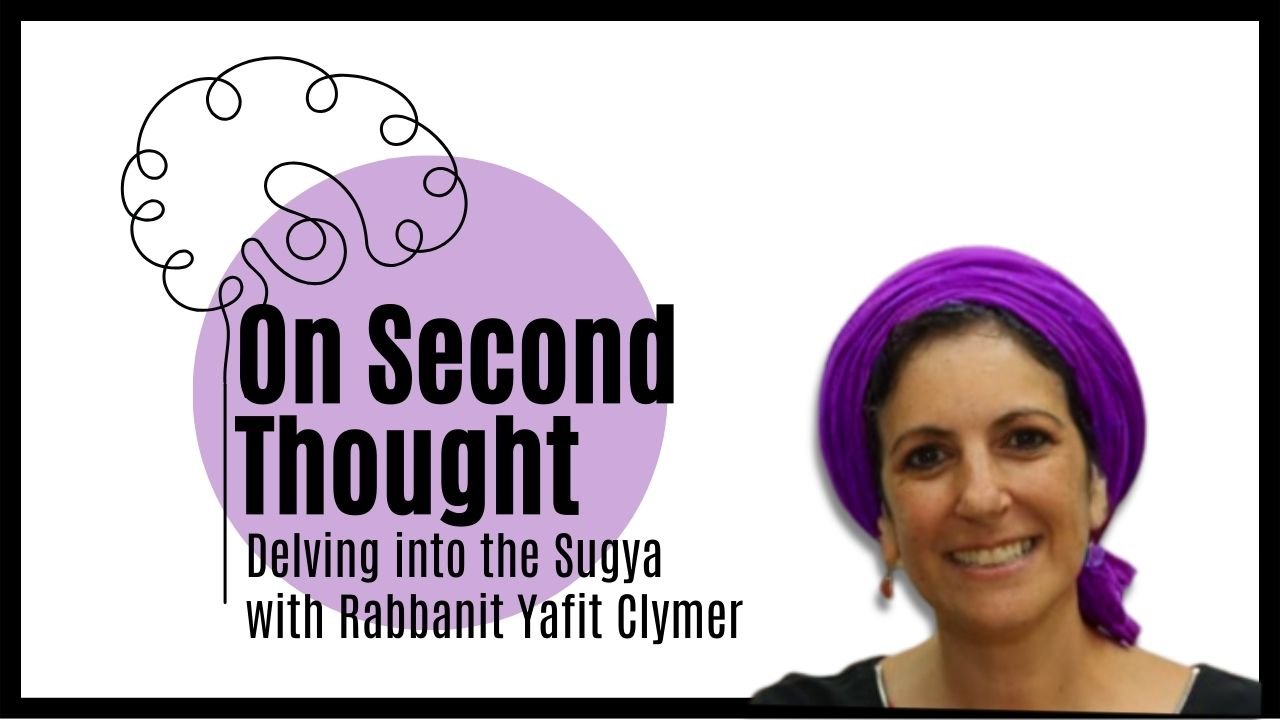On Second Thought: Delving Into the Sugya with Rabbanit Yafit Clymer
Bava Batra 110
Listen here:
Watch here:
Sources:
שלא להצטרך לבריות
שופטים יח ל
וַיָּקִ֧ימוּ לָהֶ֛ם בְּנֵי־דָ֖ן אֶת־הַפָּ֑סֶל וִ֠יהוֹנָתָ֠ן בֶּן־גֵּרְשֹׁ֨ם בֶּן־מְנַשֶּׁ֜ה ה֣וּא וּבָנָ֗יו הָי֤וּ כֹהֲנִים֙ לְשֵׁ֣בֶט הַדָּנִ֔י עַד־י֖וֹם גְּל֥וֹת הָאָֽרֶץ׃
The Danites set up the sculptured image for themselves; and Jonathan son of Gershom son of Manasseh, and his descendants, served as priests to the Danite tribe until the land went into exile.
בבא בתרא 110
“And they turned aside there and said to him:
Who brought you here [halom], and what [ma] are you doing in this place, and what do you have here [po]?” (Judges 18:3).
The Sages interpret their multiple questions.
They said to him: Do you not come from Moses, about whom it is written:
“Do not draw close to here [halom]” (Exodus 3:5)?
Do you not come from Moses, about whom it is written: “What [ma] is that in your hand” (Exodus 4:2)?
Do you not come from Moses, about whom it is written: “But as for you, stand here [po] with me” (Deuteronomy 5:27)?
Shall you, a descendant of our teacher Moses, become a priest for idol worship?
Jonathan said to them: This is the tradition that I received from the house of my father’s father: A person should always hire himself out to idol worship and not require the help of people by receiving charity,
The Gemara comments: And he, Jonathan, thought that this referred to actual idol worship, but that is not so. Rather, here the term idol worship, literally: Strange service, is referring to service, i.e., labor, that is strange, i.e., unsuitable, for him. In other words, one should be willing to perform labor that is difficult and humiliating in his eyes rather than become a recipient of charity.
As Rav said to Rav Kahana, his student: Skin a carcass in the market and take payment, but do not say: I am a great man and this matter is beneath me.
המאירי
However, it is proper for a person to not reduce himself by them (Tsdaka) and even if he is extremely poor, it is proper for him to hide his poverty and reduce his subsistence until he does not reduce himself to a job that is not worthy of him. However, if he becomes very very poor and people know it, he should find himself a job that is not appropriate for him…
רשב”ם
Let him rent himself out, except that in his heart will not be like this:
that it is foreign to him – he is important and the job is despised and ugly but there is no prohibition in it:
שהיא זרה לו – הוא חשוב והמלאכה נמבזה ומכוערה אלא שאין בה איסור:
משנה תורה, הלכות מתנות עניים י׳:י״ח
A person should always construct himself and bear hardship rather than appeal to people at large and make himself a burden on the community. Our Sages commanded, saying: “Make your Sabbaths as weekdays, and do not appeal to people at large.” Even a distinguished sage who becomes poor should involve himself in a profession – even a degrading one – rather than appeal to people at large. It is preferable for a person to skin the hide of animal carcasses, rather than tell people: “I am a great sage…” or “I am a priest, grant me sustenance.” Our Sages commanded conducting oneself in such a manner.
There were great sages who were woodchoppers, porters of beams, water-carriers for gardens, and iron-smelters and makers of charcoal, but they did not ask anything from the community, nor did they accept gifts that were given to them.
שולחן ערוך, יורה דעה רנ״ה:א׳ Siman 255
One should always avoid charity and rather roll in misery than to depend upon the help of man. And thus our Sages commanded, “Rather make thy Sabbath a week-day than be dependent on men.” And even though he be scholarly and respectable, let him engage in some occupation, even an unpleasant occupation, so as not to need the help of man.
מסילת ישרים י״א:קס״ו
However, our sages of blessed memory, who always instructed us and guided us on the paths of truth said: “love work and hate Rabanut” (Avot 1:10), and further “flay carcasses in the marketplace and earn wages and do not say, ‘I am an important man, I am a Kohen, [and it is beneath my dignity]’.” (Pesachim 113a), and further “one should always hire himself out to work which is strange to him rather than be dependent [on the help] of others” (Bava Basra 110a
![]()
Hadran’s Beyond the Daf shiurim are also available by podcast on
Beyond the Daf is where you will discover enlightening shiurim led by remarkable women, delving deep into the intricacies of Talmudic teachings, and exploring relevant and thought-provoking topics that arise from the Daf.





